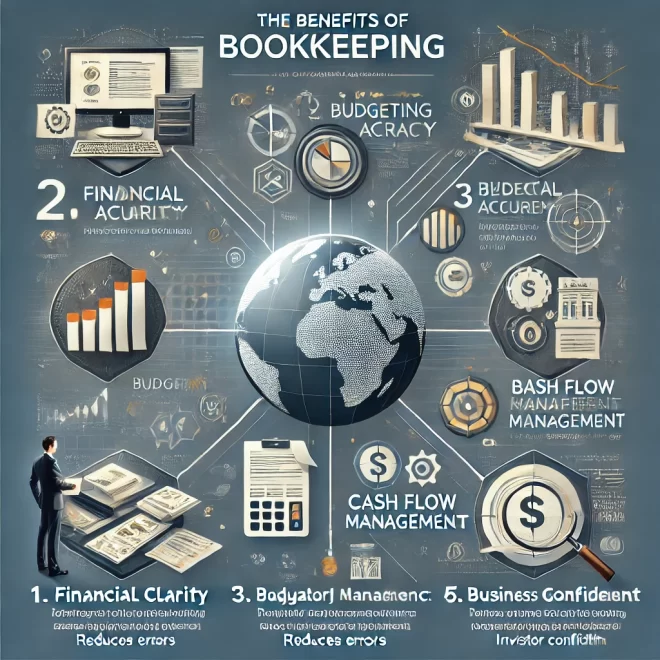

Table of Contents
ToggleIntroduction
Bookkeeping is the process of systematically recording, organizing, and managing financial transactions of a business. It serves as the backbone of financial management, ensuring accuracy, compliance, and informed decision-making. Without proper bookkeeping, businesses can struggle with financial inconsistencies, cash flow issues, and tax complications.
Definition of Bookkeeping
Bookkeeping refers to the practice of recording financial transactions, including sales, purchases, receipts, and payments, in an organized manner. It helps businesses maintain accurate financial records that are crucial for operational success, tax filing, and strategic planning.
Application of Bookkeeping
Bookkeeping is widely used across various industries for:
-
-
- Financial Management – Helps track income and expenses, ensuring businesses remain profitable.
- Regulatory Compliance – Assists in tax filings and adherence to financial regulations.
- Budgeting and Planning – Provides insights into financial health for better business planning.
- Business Growth – Helps businesses secure loans, attract investors, and evaluate profitability.
- Auditing and Reporting – Ensures transparent and error-free financial reporting for audits.
-
Benefits of Bookkeeping
-
-
- Accurate Financial Records – Keeps a systematic record of transactions, reducing errors and discrepancies.
- Improved Decision-Making – Provides real-time financial insights to make informed business decisions.
- Tax Compliance – Ensures timely and accurate tax filings, avoiding penalties.
- Efficient Cash Flow Management – Helps monitor incoming and outgoing funds to maintain liquidity.
- Fraud Prevention – Identifies unusual transactions and prevents financial mismanagement.
- Investor and Lender Confidence – Transparent financial records attract potential investors and lenders.
- Cost Reduction – Helps identify unnecessary expenses and optimize resource allocation.
- Legal Protection – Keeps businesses compliant with financial laws and regulations.
- Ease of Financial Audits – Ensures smooth audits by maintaining well-organized records.
- Business Performance Analysis – Provides financial data to measure profitability and growth.
-
Usage of Bookkeeping
-
-
- Small and Medium Enterprises (SMEs) – Helps manage day-to-day transactions and tax records.
- Corporations – Supports large-scale financial management and reporting.
- Startups – Assists in tracking initial investments and operational expenses.
- Non-Profit Organizations – Ensures compliance with grant and donor requirements.
- Freelancers and Self-Employed Individuals – Simplifies tax filings and financial management.
-
Limitations of Bookkeeping
-
-
- Time-Consuming – Requires consistent record-keeping, which can be labor-intensive.
- Costly for Small Businesses – Hiring professional bookkeepers or software can be expensive.
- Prone to Human Errors – Manual bookkeeping may lead to mistakes and miscalculations.
- Limited Analytical Insight – Bookkeeping focuses on recording data but does not provide in-depth financial analysis.
- Compliance Challenges – Changing tax laws and regulations require regular updates and adjustments.
-
Comparative Table: Manual vs. Automated Bookkeeping
| Feature | Manual Bookkeeping | Automated Bookkeeping |
|---|---|---|
| Accuracy | Prone to human errors | High accuracy with automation |
| Cost | Low initial cost | Higher software cost but cost-effective in the long run |
| Time Efficiency | Time-consuming | Saves time through automation |
| Scalability | Difficult to scale | Easily scalable for business growth |
| Compliance | Requires manual tax calculations | Ensures tax compliance with automated features |
| Security | Risk of loss or misplacement | Secure cloud storage and backup |
Conclusion
Bookkeeping is an essential aspect of financial management that ensures accuracy, compliance, and business growth. While it has some limitations, advancements in automation have made bookkeeping more efficient and accessible. By maintaining proper financial records, businesses can make informed decisions, improve cash flow, and achieve long-term success.
10 Frequently Asked Questions (FAQs)
-
-
- What is bookkeeping?
- Bookkeeping is the process of recording and organizing financial transactions of a business.
- Why is bookkeeping important?
- It ensures financial accuracy, compliance, and informed decision-making.
- What are the types of bookkeeping?
- Single-entry and double-entry bookkeeping systems.
- What’s the difference between bookkeeping and accounting?
- Bookkeeping records transactions, while accounting analyzes and interprets financial data.
- How does bookkeeping help with taxes?
- It ensures accurate tax filings and helps avoid penalties.
- Can small businesses do bookkeeping themselves?
- Yes, using bookkeeping software or hiring a professional can help.
- What is the best bookkeeping software?
- Popular options include QuickBooks, Xero, and FreshBooks.
- What happens if bookkeeping is neglected?
- It can lead to financial mismanagement, tax issues, and legal consequences.
- How often should bookkeeping be done?
- Ideally, businesses should update their books daily or weekly.
- Is manual bookkeeping still relevant?
- While manual bookkeeping is still used, automated systems are preferred for efficiency and accuracy.
- What is bookkeeping?
-
Insertion of new section 44A
